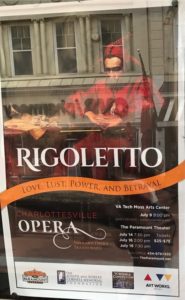Victor Hugo’s play Le Roi s’amuse—The King Has a Good Time—was best known, even during Hugo’s lifetime, as the basis for Giuseppe Verdi’s Rigoletto. Rigoletto is, in fact, pretty much Hugo’s entire play turned into an Italian opera. So it was natural for the Charlottesville Opera to invite me to speak about Hugo’s play in connection with their July 2017 production of Rigoletto :
Victor Hugo, Artistic Freedom and Free Speech:
The Saga of the Play That Became Rigoletto
A Talk by Marva Barnett
Monday, July 17, 4:00 p.m., at the University of Virginia Colonnade Club
Having always enjoyed reading Le Roi s’amuse—perhaps because of the melodramatic elements that brought the play so many critics’ insults but that make it so perfect for opera—I jumped at the chance to discover more about its history.
This play took Hugo to court twice. First he protested the government minister’ s shutting down his play the morning after it opened. Then, 25 years later, he argued to get deserved royalties from Rigoletto. After all, he’d written the original play.
s shutting down his play the morning after it opened. Then, 25 years later, he argued to get deserved royalties from Rigoletto. After all, he’d written the original play.
Le Roi s’amuse was but one of Hugo’s plays censored by the French government, but his experience arguing in court his own case for give us some of Hugo’s strongest arguments in his lifelong battle for freedom of speech and artistic freedom—the same thing, after all. And his triumph in capturing his audience was a turning point toward his future success as a legislator and public speaker—even though he lost both his cases.
 I’ve been asked to share my talk with you. Click here for the entire text.
I’ve been asked to share my talk with you. Click here for the entire text.
